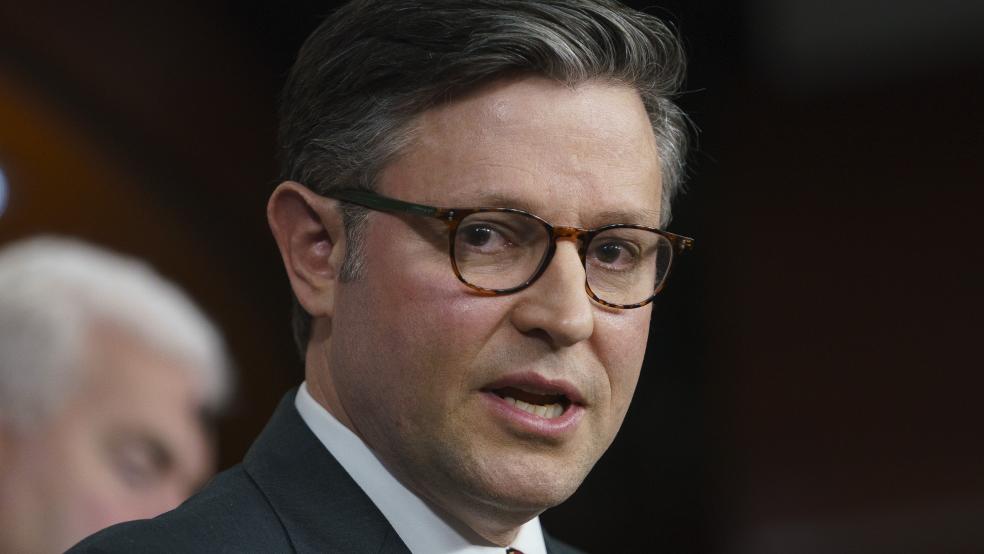We’re just over a week away from the first of two government funding deadlines looming in early March. Appropriators are still working to finalize the annual spending bills for the fiscal year that started back in October — but House and Senate leaders are reportedly still clashing over Republican demands for partisan policy riders on topics such as abortion, diversity, guns and student loan debt.
“Senior aides in both parties say another short-term continuing resolution will almost certainly be necessary to avoid a partial government shutdown on March 1 and March 8,” Punchbowl News reported Thursday. “Needless to say, this will be a problem for Speaker Mike Johnson, who has made opposition to stopgap funding measures the one place he’s willing to express strong opinions.”
The odds of a shutdown are fairly high. In fact, Republican Rep. Patrick McHenry of North Carolina, the chair of the House Financial Services Committee who served as temporary speaker after Kevin McCarthy was ousted from Republican leadership, told CBS News that he sees them as “50-50.”
McHenry told CBS News that is a “preventable disaster,” but he also acknowledged that the chances of a shutdown hinge largely on Johnson and how the inexperienced speaker handles the fear of also being ousted.
Johnson earlier this year agreed to $1.66 trillion in discretionary spending for the year. Now, as appropriators work to flesh out the details of their spending plans, Johnson is reportedly clinging to a hard line on the policy riders, seeking to extract some conservative wins and avoid further fury from the hard right.
House Freedom Caucus members on Wednesday called on Johnson to fight for conservative policy provisions and questioned why Republicans would proceed with a spending deal that didn’t meet their policy or spending objectives. But those conservative policy riders have no chance of passing the Democratic-led Senate, meaning that they would only boost the likelihood of a shutdown.
“All the speaker has to do is allow the Appropriations Committee to go get a deal,” McHenry told CBS. “We will have a deal by March 1 and March 8 if we can allow just momentum to occur. If the speaker wishes to stop it for whatever reason, we'll probably have a government shutdown. It will come down to the speaker's decision on whether or not to just fund the government and get on with the deal.”
McHenry said that if Johnson allows fear to drive his decision, the result will be a shutdown — and, he warned, that result would undercut Republican goals. “What I believe is, we will get higher spending and less policy as a result of the government shutdown,” he said.
McHenry, who was a key ally of McCarthy’s, didn’t mince words about Johnson’s difficulties since becoming speaker after a painful process that saw other candidates fail to get the needed votes.
“We went through five choices and Mike Johnson's the fifth choice,” McHenry said. “He has not been around these leadership decisions. He's had a really tough process. We’ve thrown him into the deepest end of the pool with the heaviest weights around him and [we’re] trying to teach him how to learn to swim. It's been a rough couple of months.”
McHenry also pointed to Johnson as the main impediment to passing more aid to Ukraine, saying that a majority of the House would support the $95.3 billion bill passed by the Senate to fund Ukraine, Israel and Taiwan.
The bottom line: “If there is a master plan to keep the government funded through March 1, no one seems to know what it is yet,” CNN reported. “Complicated issues have been kicked up to the leadership level where it’s not clear they can be resolved quickly, especially if Johnson digs in. And if negotiators can’t announce a deal by the weekend or early next week, it’s unclear how even a few of those bills could pass in time.”
The tight deadline means that Johnson could well have to decide whether to move ahead with another short-term funding fix, even if it incurs the wrath of his right flank. Or he could follow the suggestion of the Freedom Caucus and pursue a full-year spending patch that would come with an across-the-board 1% spending cut.
For now, though, Congress has eight days and counting until the first shutdown deadline.





